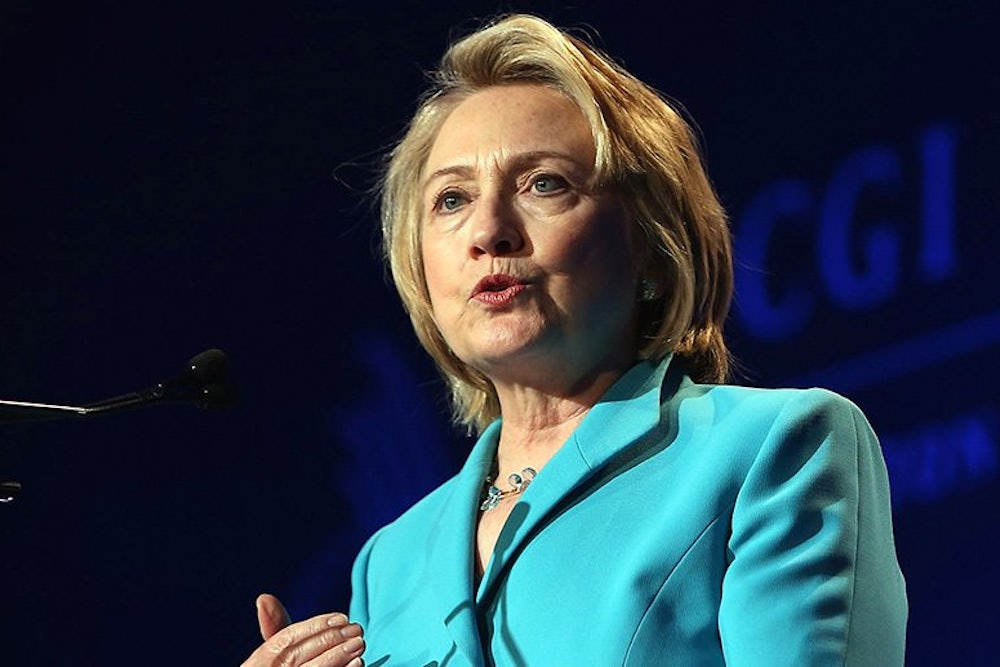Ken Auletta's strange piece in The New Yorker about the relationship between Hillary Clinton and the media attempts to explain the former's dislike of the latter, but ends up confusing a number of issues about both. The biggest problem is that Auletta doesn't distinguish between the real challenges Clinton faces and the sideshows that have no bearing on whether she will be elected.
Clinton will have several media-related issues confronting her if she decides to run. The first is that she is a woman and will have to deal with various sexist double standards. The second is that right-wing loons dislike her and are guaranteed to contrive nonsense about her and her family. And the third is that she has a bad relationship with the mainstream media.
As an example of the first, I will merely mention the name of Chris Matthews. As an example of the second, I would spotlight one of Auletta's examples: a right-wing blogger who claimed Clinton had brain cancer, and also stated that Chelsea Clinton is not the biological daughter of Bill Clinton. In the third category I would cite the 2008 primary. The Clintonites think the press cares about silly and trivial things, and thus gives Hillary a raw deal; others might note that Hillary ran a divisive and dishonest campaign, and that when a candidate does so, she is likely to garner worse press than her opponents. (Auletta cites some figures about Obama getting better press in 2008, as if all campaigns are equally honest or dirty and should be covered as such.)
The reason to distinguish between these things is that the last of them might really matter. The nonsense from the right is of the sort that everyone in politics has to deal with at one time or another, even if not quite to this degree. If absurd internet rumors have any effect, they (like comments about her clothes or age) will only help Clinton by enlisting sympathy for her, and making all legitimate criticisms look spiteful. (This doesn't mean they are any less despicable.)
Auletta fails to make this distinction. He quotes Clinton spokesman Philippe Reines (who sounds only slightly less charming than Mark Penn) as saying that those who want to blame Clinton for the deaths in Benghazi are up to no good. But then Reines goes into the typical Clintonite rant about the mainstream media only being interested in clicks and eyeballs, which only raises of the question of why that same mainstream media has not obsessively gone after Clinton over Benghazi.
Auletta further muddies his argument by focusing extensively on the Clinton-haters of the 1990s, from David Brock (reformed but still insufferable) to Chris Ruddy and Richard Mellon Scaife. The latter two men have now become dining buddies with Bill Clinton, although this appears to be a sign solely of the fact that Clinton has a voracious appetite for turning anyone and everyone into an admirer. Auletta then veers into a discussion about Matthew Continetti, the co-founder of the Washington Free Beacon, which, from Auletta's account, sounds like a halfway serious news source rather than a laughable and cynical hothouse of paranoia. (If Continetti believes even half of what his site publishes...)
I suppose Auletta wants us to see Continetti's project as the new American Spectator, out to smash a Clinton run for the presidency. The problem, which the piece never confronts, is that the right-wing conspiracy never did much to imperil any of Bill Clinton's campaigns. (You could argue that it did cause trouble for his presidency.) Perhaps Continetti is a sign that formerly establishment Republicans (Continetti is Bill Kristol's son-in-law and a former Weekly Standard writer) have gotten crazier, and that the craziness will travel in the other direction, too: in short, that crazy right-wing ideas will appear more often in the mainstream press. But certain crazy right-wing ideas have always found a way into the mainstream press: just witness many of the 1990s Clinton scandals. If anything, they seem to have had an easier time doing so back then. It's thus not clear what Auletta's clichéd comment about today's media—"In the years since Clinton's Presidential campaign, the media has become more polarized, less thoughtful, and fasted paced"—has to do with his argument.
This all leaves one remaining question: If right-wing ideas can infiltrate the mainstream press, does that disprove my complaint that Auletta's piece doesn't draw a distinction between the right and the mainstream? No. For starters, most of the crazy right-wing ideas about Clinton will never find any sort of mass currency. Moreover, the reason to think about these two things distinctly is that one of them Clinton can't do anything about: there will always be rightwingers who hate her. Clinton's relationship with the mainstream press is something she can largely control, and it will hinge on whether she wants to run the same type of campaign that she did in 2008.
